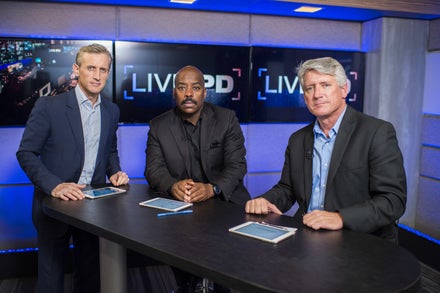
In a year when police have killed more than 700 people, a new television show is aiming to begin a conversation that could help heal the fraught relationship between law enforcement and the general public.
Beginning Oct. 28, A&E will dedicate two hours every Friday night to Live PD, a live docuseries that trails six police units in various U.S. cities as they patrol the streets. The show, which will run for eight weeks, is unlike anything that’s ever been attempted before on television: A fixed rig and handheld cameras will transmit footage directly into the studio for on-camera analysis by a pair of Dallas detectives and host Dan Abrams, ABC News’ chief legal analyst.
“I can’t imagine a more important time for a program like this to air,” Live PD showrunner David Doss told BuzzFeed News in a phone interview. “I think it’s very important that all viewers have a chance to take a look at things from all perspectives on any kind of law enforcement action. The way news moves back and forth over certain subjects, it would be fair to say that a very one-dimensional picture of law enforcement has come out over the last 18 or 24 months, and I think that an awful lot of police officers are very, very much wanting to get that back in a less lopsided balance.”
Image rehabilitation was undoubtedly an incentive for the police departments that have chosen to participate — in Arizona, Utah, Oklahoma, Florida, South Carolina, and Connecticut — but Doss stressed that the show very much intends to be a “warts and all” viewing experience. “To be crystal clear, we have no agreements with anyone to sugarcoat anything,” he said. “I wouldn’t be involved in this if we did.”
This July, the world watched as Diamond “Lavish” Reynolds took to Facebook Live to broadcast the death of her boyfriend, Philando Castile, after he was shot by the police officer who had pulled them over for having a broken taillight. The altercation became headline news and the video was the centerpiece of every outlet’s report. So what happens if one of Live PD’s officers shoots a suspect while cameras are rolling? “We’re not going to be shooting anybody live on television,” said Doss, who explained that — like many live programs — Live PD is broadcast with a delay. “The integrity of the program comes from being live; it’s also kind of risky because we don’t know how things are going to end. We don’t really know what’s going to happen.”
Doss wouldn’t clarify exactly how long the delay is and said that he, along with A&E executives and the show’s executive producer Dan Cesareo, would decide when and if to cut the live feed. “We’re not going to show anything that horrific or grisly,” he said. “Now, if it happens, are we going to report on it? Are we going to find a way to include that it happened? Yes. We’re going to do that. We’re not out to hide anything.”
Dan Abrams, Kevin Jackson, and Rich Emberlin in the Live PD studio. Scott Gries
Should the show encounter a moment that needs to be excised, the producers have established several contingency plans to fill in the air time. In addition to cutting to the in-studio commentators — Abrams along with Dallas Police Department Detectives Rich Emberlin and Kevin Jackson — they’ve produced pretaped day-in-the-life pieces that aim to illuminate the off-duty activities of the officers featured.
“They’re about, if you will, humanizing or bringing biographical aspects to some of the law officers,” Doss said. “This is a period of time where law enforcement’s been painted in a one-dimensional way. These officers have kids, they have grandparents they’re taking care of, they have children whose grades they’re worried about — they’re doing everything else everyone is worried about. Our pieces are going to give you more of what they have to deal with at home when they’re not out there doing their jobs.”
But Doss fundamentally rejects the argument that because there are no humanizing video packages on the victims of police shootings, Live PD is inherently designed to curry favor for law enforcement officers.
“We’re not coming out to say, ‘Boy, law enforcement has been portrayed poorly, let us fix it,’” he said. “That’s not the goal. We’re very mindful of how people will view programs like this, so we’re not here as apologists for law enforcement, we’re not here as defenders of law enforcement. We’re just documenting what happens.”


